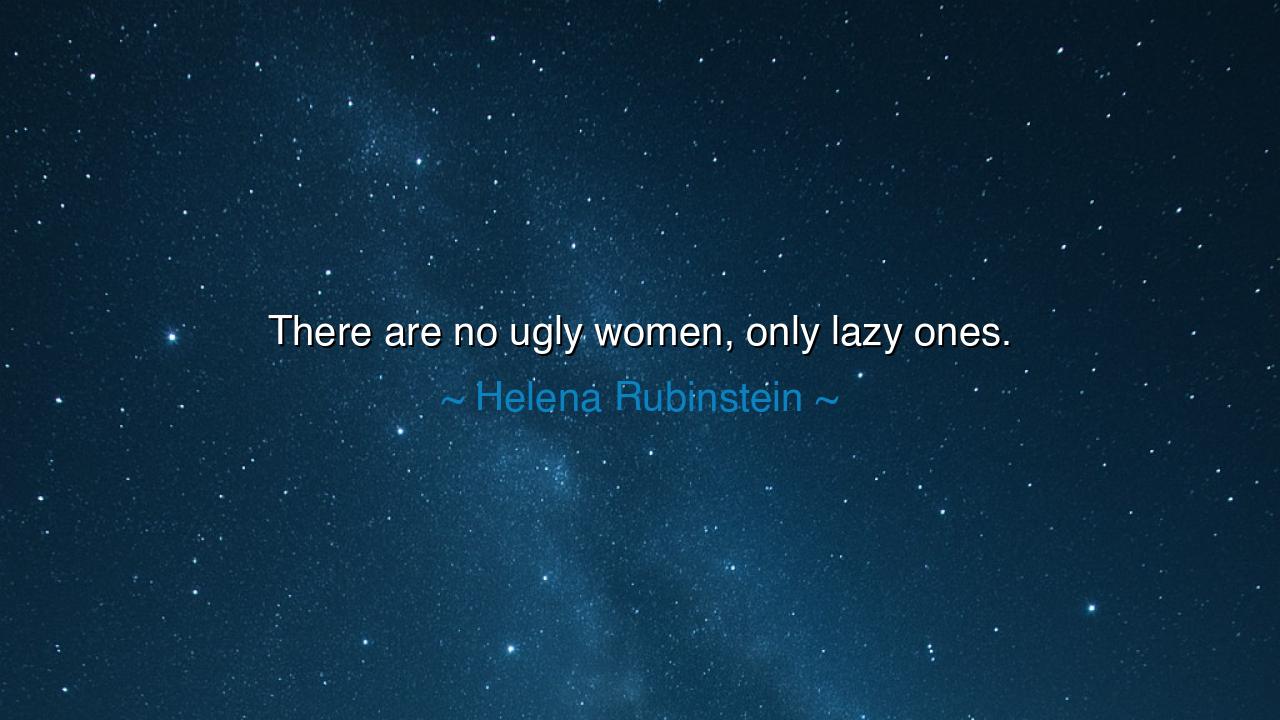
There are no ugly women, only lazy ones.






Hear the bold declaration of Helena Rubinstein: “There are no ugly women, only lazy ones.” In this saying lies not cruelty, but a fierce conviction that beauty is not the gift of chance, but the fruit of effort. Rubinstein, who rose from humble beginnings to become one of the great empresses of cosmetics, speaks with the authority of one who believed that beauty could be cultivated, shaped, and awakened in every woman who dared to care for herself.
The ancients too spoke of this truth. In Greece, the concept of kalokagathia united outward beauty with inner virtue, teaching that the cultivation of the body reflected the cultivation of the soul. To call a woman ugly was not to condemn her nature, but to say she had neglected the art of adornment, of self-care, of discipline. Rubinstein echoes this wisdom: that laziness is the true enemy, not plainness. For beauty is not fixed in the stars—it is fashioned by hands, choices, and the will to present oneself with dignity.
Consider the story of Cleopatra. Though history tells us she was not the most beautiful woman of her age, she mastered the arts of adornment, charisma, and presence. With perfumes, cosmetics, and charm, she captivated emperors and bent the course of empires. She was not ruled by fate but by her refusal to be lazy in the art of self-presentation. Her triumphs show that ugliness is often not in the features, but in the neglect of them.
Rubinstein’s words also carry a deeper fire: they remind women that power often lies in self-mastery. To present oneself well is not vanity, but a weapon against invisibility, against being dismissed or diminished. She lived in a world where women’s worth was often measured by their appearance, and instead of despairing, she armed them with tools and confidence to meet that judgment on their own terms. In her defiance, she turned beauty into a discipline, a craft, and even an act of survival.
So let the generations remember: there are no ugly women, only those who surrender to neglect. Every face can shine, every figure can be adorned, every soul can radiate dignity—if only the effort is made. For beauty is not a gift reserved for the few, but a birthright of all who choose to awaken it. The lesson is not to worship appearance alone, but to recognize the power of intention, effort, and self-respect in shaping how the world beholds us.






TLNguyen thi luu
This quote brings up an interesting, though controversial, point about the role of effort in beauty. But isn't it problematic to make beauty synonymous with effort? Shouldn’t the focus be on embracing natural beauty and finding confidence in one’s unique appearance? How can we shift the narrative from ‘improvement’ to ‘acceptance’ when it comes to beauty standards?
MHLe thi mai hong
Helena Rubinstein’s quote implies that women who don’t fit conventional beauty standards are just not trying hard enough. But could this perspective lead to harmful judgments about people’s worth based on their appearance? What about women who don’t conform to mainstream beauty ideals for reasons like cultural differences or personal choice? How do we redefine beauty in a way that is more inclusive and empowering?
HNHuong Nguyen
While Rubinstein’s quote may have been meant to encourage self-care and confidence, it also implies that women are responsible for their appearance in a way that might feel burdensome. What does it say about societal expectations when beauty is presented as something that requires constant work? How does this affect women’s self-image and how they perceive their worth?
NTBao tram Nguyen thi
This quote seems to reduce the concept of beauty to a matter of effort, but doesn’t it ignore the diversity of individual perceptions of beauty? Is it fair to suggest that someone is ‘lazy’ just because they don't meet a conventional standard of beauty? Shouldn’t beauty be celebrated in all its forms, regardless of how much time or energy is invested in appearances?